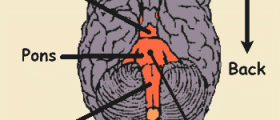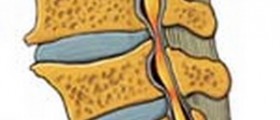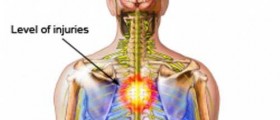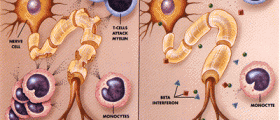
In the following text, we will focus on thecauses and symptoms of nerve damage and pain. Three types of nerves are presentin our body. They have a great deal of functions to perform. They areresponsible for successful breathing and monitoring the work of heat and coldsensing muscles. These three types are motor nerves (which send information fromthe spinal cord and the brain, thus controlling the actions and movement),autonomic nerves (which control heart rate, digestion, blood pressure andregulate the body temperature) and sensory nerves ( which are responsible for theperception of pain, since they relay the information to the brain and spinalcord from the muscles and skin). Since the nerves have an enormous role in bodyfunctioning, damaging them can have serious consequences. The symptoms can bebenign, but also very grave.
The fact remains that the damage and pain can becaused by a number of things. Symptoms can be very different and they depend onthe type of the nerve affected. When we talk about the motor nerves, symptomssuch as muscle atrophy, twitching, weakness and paralysis are possible if thiskind of nerve is damaged. If the autonomic nerve is damaged, an individual willexperience dizziness, constipation, bladder and sexual problems, dry mouth andeyes, excessive or less than enough sweating and inability to detect chestpain. Problems with positional awareness, pain, tingling sensation, numbnessand sensitivity are connected with damaged sensory nerve. Nerve damage typesare very diverse, since their possible number exceeds 100. But several are verycommon. Cancer can crush nerves and cause nerve problems. Taking certainsubstances and drugs can induce nerve pain. Such are cancer chemotherapy andsubstances like arsenic, lead or mercury. Trauma can affect and damage thenerve. Even pinching can provoke problems. Many autoimmune diseases can inducesymptoms similar to damaged nerve. Lupus, multiple sclerosis and inflammatorybowel disease are some of these conditions. Lack of some nutrient, such asvitamin B12 and B6, can lead to nerve problems.
Too much alcohol is anotherculprit for the nerve damage. Almost every second diabetes patient developsproblems with nerves. Although any kind of a nerve can be affected, sensory aremost prone to damage from diabetes. The condition which affects motor neurons, responsiblefor exchanging the information between the brain and spinal column on one sideand muscles on the other, produces nerve damage and pain. Several conditions,like hepatitis C, Lyme disease, HIV and herpes can also be responsible.Sometimes this damage cannot be removed, but in most cases it is possible.First part of the treatment, depending on the type of damage, consists ofsurgery to repair the trauma, autoimmune medications, balancing blood levelsfor diabetes patients, nutritional deficiency correction and using differentdrugs if the present ones cause nerve problems. For the pain, you can take anti-seizuremedications, tricyclic antidepressants and painkillers. If mentioned therapiesand treatments aren't producing wanted results, acupuncture, hypnosis andbiofeedback are next possible steps.









_f_280x120.jpg)



_f_280x120.jpg)

_f_280x120.jpg)
Your thoughts on this
Loading...